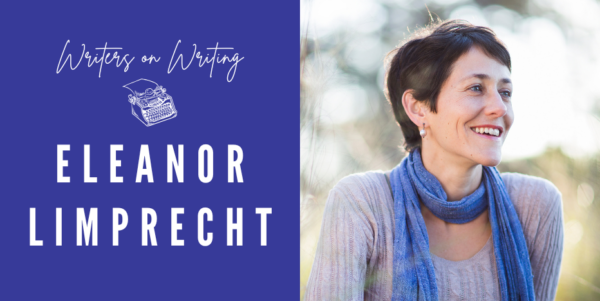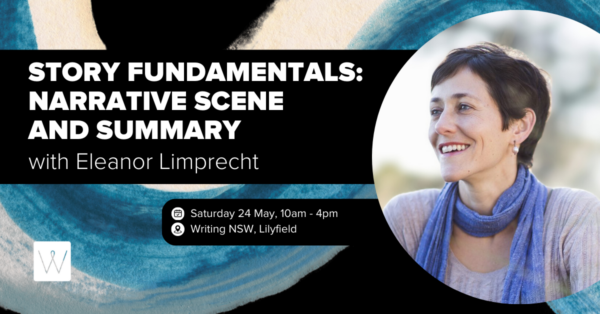
Writers on Writing is our regular conversation with a writer or industry professional about the writing craft, industry insights, and their own practice. This week, we spoke to Eleanor Limprecht about using scene and summary in narratives, and how writing in group environments exposes us to new, exciting ideas.
In what circumstances might summary be more important than scene when writing?
Summary is important when you want to speed up time – when you want to give the gist of what has happened in the narrative without lingering.
Heres an example from Steinbeck’s The Grapes of Wrath, from the beginning of Chapter 16:
‘Joads and Wilsons crawled westward as a unit: El Reno and Bridgeport, Clinton, Elk City, Sayre, and Texola. There’s the border and Oklahoma was behind. And this day the cars crawled on and on, through the Panhandle of Texas. Shamrock and Alanreed, Groom and Yarnell. They went through Amarillo in the evening, drove too long, and camped when it was dusk. They were tired and dusty and hot.’
Summary can give the sense (as it does here) of distance and time covered, of knowing your characters can get from A to B; of knowing a day or a week or a year might pass without requiring a blow-by-blow account. This day was long and they were tired. They covered a lot of ground, but nothing important happened, so we have a summary. When pivotal, revealing moments happen in a story, they are most powerful in scene.
You’ve published four novels, with a fifth coming soon in 2026. How do you navigate plotting your novels? Do you have every chapter planned, or only a vague outline when you start?
I am a write-first-plot-later kind of gal. I have often done a lot of research or reading before the first draft and I know the main source of tension or problem in the novel, but I don’t know how (or whether) it will resolve. After a messy first draft I do create a chapter outline, which helps me structure once I’ve allowed my characters to help me figure out what direction the novel will go in.
What advice would you give to writers who are nervous about writing in a group environment? Why can it be helpful to write in groups?
I get it, I’m not a natural group writer either, but I think the beauty of doing exercises in these environments is the way that your brain surprises you when you are outside of your comfort zone. We are all used to sitting down at our own desks and fighting the urge to do other things, but in a classroom with ten other people writing beside you there is another energy that can deliver the seeds of new ideas. Your classroom writing will never be the fully polished thing, but nine times out of ten there is some line or sentence you will want to follow.
Your latest book, The Coast, is written from multiple perspectives. What does a writer need to consider when writing from more than one perspective?
In narratives with multiple perspectives, a writer needs to work on changing the voice of the different characters and the way they experience and see the world. In The Coast, I wrote the different perspectives in chunks before cutting them up and interweaving them as chapters, and that enabled me to spend longer in each voice and inhabit them more extensively before I changed perspective.
Eleanor Limprecht is the author of four novels: The Coast, The Passengers, Long Bay and What Was Left (shortlisted for the 2014 ALS Gold Medal). Eleanor’s short fiction and essays have been published various places including Best Australian Stories, Meanjin, The Saturday Paper, The Griffith Review, Kill Your Darlings and The Big Issue. She’s been the recipient of grants, scholarships and fellowships from places including the Australia Council, the Copyright Agency and the Australian Society of Authors Blake-Beckett Trust. She is currently a Visiting Fellow at the State Library of NSW. Eleanor has a Doctorate in Creative Writing from UTS, lectured in Creative Writing at UTS and teaches creative writing and research skills in various places.
Join Eleanor Limprecht for her course Story Fundamentals: Narrative Scene and Summary, Saturday 24 May 2025, 10am – 4pm.
If you want to be the first to read great advice, prompts and inspiration from our incredible tutors, subscribe to our weekly e-newsletter Newsbite.
More from Writing NSW
Check out our full range of writing courses in Sydney, our online writing courses and our feedback programs to see how we can help you on your creative writing journey. Find out about our competitions and opportunities, as well as writing groups across NSW, and sign up to our weekly newsletter for writing events, opportunities and giveaways.

